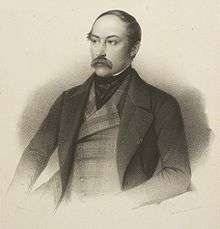Adolf Heinrich von Arnim-Boitzenburg
| Adolf Heinrich von Arnim-Boitzenburg | |
|---|---|
 | |
| 1st Prime Minister of Prussia | |
|
In office 19 March – 29 March 1848 | |
| Monarch | Frederick William IV |
| Preceded by | Position created |
| Succeeded by | Gottfried Ludolf Camphausen |
| Personal details | |
| Born |
10 April 1803 |
| Died |
8 January 1868 (aged 64) Schloss Boitzenburg, Brandenburg, Prussia |
| Political party | None |
Graf[1] Adolf Heinrich von Arnim-Boitzenburg (10 April 1803 – 8 January 1868) was a German statesman, and the first Prime Minister of Prussia.
Biography
He was born on 10 April 1803 in Berlin.
After finishing his studies, he joined the Prussian civil service and soon became Landrat in the Uckermark. In 1833 he became Regierungspräsident in the Government Region of Stralsund. He later assumed the same position in Aix-la-Chapelle and Merseburg. In 1840 he became Upper President of the Province of Posen, and in 1842 Prussian Minister of the Interior. From 19 March 1848 to 29 March 1848 he was the Prussian Prime Minister.
From 18 May to 10 June 1848 he was a representative for Prenzlau in the Frankfurt Parliament. In 1850 he was a member of the Erfurt Union parliament, in 1854-1868 he belonged to various chambers of the Prussian Parliament and in 1839–1868 he belonged to the provincial parliament of Brandenburg.
Arnim is known to this day for his remarks as Prussian Interior Minister concerning Heinrich Heine's poem Die schlesischen Weber. In a report to King Frederick William IV he described it as "an address to the poor amongst the populace, held in an inflammatory tone and filled with criminal utterances" ("eine in aufrührerischem Ton gehaltene und mit verbrecherischen Äußerungen angefüllte Ansprache an die Armen im Volke"). Subsequently, the Royal Prussian Superior Court of Justice banned the poem, which in 1846 led to a prison sentence for a person who recited it.
He died on 8 January 1868.
References
- ↑ Regarding personal names: Graf was a title before 1919, but now is regarded as part of the surname. It is translated as Count. Before the August 1919 abolition of nobility as a legal class, titles preceded the full name when given (Graf Helmuth James von Moltke). Since 1919, these titles, along with any nobiliary prefix (von, zu, etc.), can be used, but are regarded as a dependent part of the surname, and thus come after any given names (Helmuth James Graf von Moltke). Titles and all dependent parts of surnames are ignored in alphabetical sorting. The feminine form is Gräfin.
.jpg)